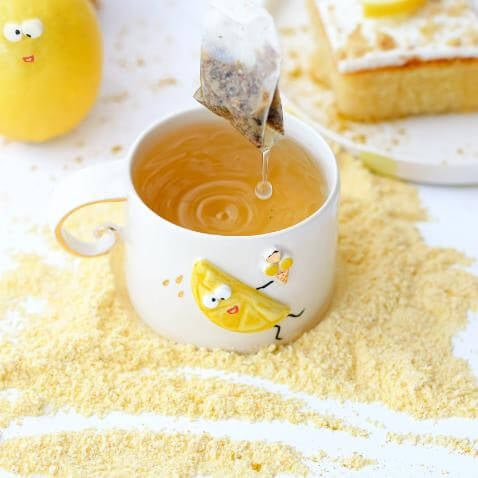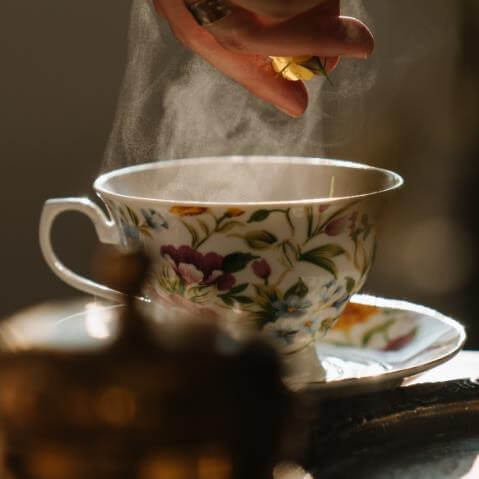Introduction
One of the most important sources of remedies is plants. The earth is blessed with thousands of plants that have served as a source of drugs for different diseases and disorders since time immemorial. In fact, according to a study, only about ten percent of all vascular plants are used as medicinal plants
[1]
. Moreso, according to the
United States Department of Agriculture[2]
, USDA, over 40% of drugs available in the Western world are obtained from plant origin.
Indeed, plants are nature’s gift to help us pursue a disease-free life. One of these amazing gifts of nature is the Raspberry leaf. Raspberry leaf is an impressive plant with loads of health benefits, especially for females. Now, if you are lucky enough to make tea off this plant, be certain you are getting the combined health benefits of tea and the plants.
Raspberry has been shown to enhance the immune system, regulate hormone levels, and monitor the body’s functions. The leaf encompasses an array of vitamins and micronutrients, all of which play a role in our overall well-being and aid in mitigating oxidative stress that can disrupt the body’s equilibrium.
There is a lot to say about this impressive plant, but let’s set the ball rolling by discussing what raspberry is, its active constituents, health benefits, side effects, and some key things to know about raspberry.
What is Raspberry Leaf?

The raspberry plant, officially
Rubus idaeus
, has green leaves studded with juicy red raspberry fruits
[3]
. The leaves are packed with tannins like ellagic acid, flavonoids, and some phenolic acids like chlorogenic acid, also found in coffee. Thanks to the tannins, the taste of red raspberry leaf is astringent—if not a bit bitter—which some people liken to a very slightly sweet black tea.
What’s in Raspberry Leaf?
Raspberry is impressive because of the powerful constituents it contains. They all work together to provide the different health benefits associated with this plant. Below are a few:
❖ Vitamin C: Raspberries provide an amount of vitamin C, an antioxidant that helps safeguard the body against harm caused by radicals. Consuming a cup of raspberries fulfills around 54% of the Daily Value (DV) for vitamin C
[4]
.
❖ Manganese: Additionally, raspberries serve as a source of manganese, a mineral that plays a role in several bodily functions such as bone health, blood sugar regulation, and energy production. A cup of raspberries contains 41% of the DV for manganese
[4]
.
❖ Fiber: Raspberries are recognized for their dietary fiber content, which contributes to a feeling of fullness and satisfaction. With about 8 grams of fiber per cup, raspberries fulfill 26% of the DV
[4]
.
❖ Nutrients: Apart from the aforementioned nutrients, raspberries also contain smaller yet valuable quantities of other nutrients like vitamin K, folate, potassium, and magnesium.
Raspberry tea contains a different amount of red raspberry leaf, and some have created a red raspberry tea made of a blend of additional herbals that will add a sweet, fruity taste. What is consistent, though, is the calorie count. There are zero calories in one cup of plain brewed tea.
Health Benefits of Raspberry.

As said earlier, raspberry provides you with several health benefits. Let’s talk about some of them;
1.
Premenstrual cramps, Pregnancy, and Labor.
You may have heard that drinking red raspberry leaf tea can help to jumpstart or shorten labor. Pregnant women have used tea to help ease delivery for centuries. But does it help?
Red raspberry leaf is said to act on the uterus to help it contract. Anecdotally, women drink tea to help relieve menstrual cramps. Researchers found one 2021 study linking the use of red raspberry leaf during pregnancy to a 3.5-fold increased risk of cesarean section. However, the authors note that the group was relatively small—only 34 women out of 600 in the study
[5]
.
However, it is important to note that there is a need for more safety data to fully ascertain the beneficial effects of this plant in pregnancy and labor.
2.
Induction of Labor
In a survey, 63% of the certified nurse-midwives (CNM) reported using red raspberry leaf as an herbal supplement for labor induction in pregnant women
[6]
. The most cited reason for using red raspberry leaf and other herbal preparations was that they are a “natural” alternative to pitocin.
However, this claim is still subjected to further investigation as 21% of CNMs reported complications associated with herbal labor stimulants, including early labor, prolonged uterine contractions, nausea, and vomiting. In fact, in a 2021 study, it was concluded that raspberry leaf should not be used for labor induction because its adverse effects may outweigh its perceived benefit
[5]
.
3.
Weight Loss
Red raspberry leaf has been recommended as a tonic to improve fat metabolism and encourage weight loss. It is often sold as a “detoxifying” supplement to improve body composition and overall health
[7]
. Also, it’s been shown that raspberry may promote the feeling of fullness, thereby decreasing the rate of food intake.
4.
Antioxidant Properties.
Red raspberry leaf contains vitamins E, tannins, and flavonoids, potent antioxidants. Antioxidants can help protect against the free radicals that may damage cells and contribute toward developing diseases such as cancer and cardiovascular diseases. Therefore, red raspberry leave may have some benefits in reducing the risk of these conditions.
An older test tube investigating the effect of red raspberry leaves on human laryngeal cancer and colon cancer suggests the leaves may have antioxidant properties and could provide beneficial health effects
[8]
.
5.
Lowers Inflammation.
Red raspberry leaf is rich in polyphenols, plant compounds with antioxidant properties. Even better: The leaves have been found to have higher concentrations of these anti-aging compounds compared to the fruit itself. Not only do antioxidants protect cells from damage, but they also help with lowering inflammation
[9]
.
Inflammation is linked to several chronic diseases, including heart disease, type 2 diabetes, and Alzheimer’s.
6.
It is Great For The Skin

Raspberry tea is filled with vitamins A, B, C, and Vitamin E, and all of these minerals are full of healthful properties that help in bringing a natural glow to the skin(skincare tips for pregnant women). Not only that, but drinking this magical tea may also help you get rid of psoriasis, acne, eczema, wrinkles, discoloration, hyperpigmentation, and other skin issues.
7.
Lactation Support
Red raspberry leaf is a traditional remedy for boosting milk production in lactating women
[10]
. However, clinical research has not shown any benefit to drinking red raspberry leaf tea for women who are breastfeeding.
Although no side effects to drinking red raspberry leaf tea have been detected in these trials, it does contain polyphenols that are detectable in breast milk. Nursing women should discuss any use of supplements with their healthcare providers.
Possible Side Effects
Raspberry leaf has long been used as a remedy to benefit women’s health. It’s important to note that while it is generally safe for people, there are considerations to bear in mind.
Allergies
Many individuals may have allergies to raspberries or similar plants like strawberries or peaches. If you know you have allergies to these fruits, it is prudent to be cautious when using raspberry leaf products.
Uterine Effects
Raspberry leaf is often associated with toning the uterus and supporting pregnancy and childbirth. However, concerns have been regarding its potential to stimulate contractions during pregnancy, which could lead to complications. If you are pregnant or planning to conceive, it’s advisable to consult with healthcare before incorporating raspberry leaf into your routine.
Possible Digestive Issues:
Although rare, some people may experience discomfort like nausea or diarrhea after consuming raspberry leaf. If you encounter these symptoms, it is wise to discontinue use and seek advice from a healthcare provider.
Managing Blood Sugar Levels:
Raspberry leaf has been found to exert an influence on blood sugar levels. If you are managing diabetes or relying on medications to regulate your blood sugar, it is advisable to monitor your levels using raspberry leaves.
In fact, it was found that a woman with gestational diabetes who consumed raspberry leaf tea at 32 weeks of pregnancy developed hypoglycemia, or blood sugar that was too low. She was taking insulin, and the study authors suggest that the raspberry tea may affect the insulin needed to treat high blood sugar in people with gestational diabetes
[10]
.
Additionally, seeking guidance from your healthcare provider is essential to ensure your safety and well-being.
Possible Medication Interactions:
Raspberry leaf may interact with medications, like anticoagulants (blood thinners) or those prescribed for blood pressure. To avoid any effects or unexpected outcomes, you must disclose all supplements you are currently taking to your healthcare provider. Their expertise will help determine any interactions and guide you accordingly
[11]
Common Questions About Raspberry and Pregnancy and Labor.

There are some common questions and confusions people have with Raspberry. Let’s talk about a few of those.
Can I drink red raspberry leaf tea to induce labor?
There’s no evidence that red raspberry leaf tea induces labor, but it’s possible that consuming a lot of the tea at once could lead to intense contractions that distress your baby. It could also make you feel sick or give you diarrhea. It’s best not to drink much raspberry leaf tea in one go, either earlier in pregnancy or to try to kick-start labor.
Some doctors and midwives advise against taking anything that could interfere with labor, mainly if it hasn’t been well studied, like raspberry leaf tea. If you want to try it, you could sip a little of the tea during early labor or at the hospital or birth center.
Don’t drink the tea if your labor is being induced, as the compounds in the tea could interfere with the induction process.
How Much Should I Drink?
There’s no universal recommendation on how much to drink. If you are pregnant, talk to your doctor before consuming the tea. Dr. Sharma, for one, does not recommend her patients use herbal supplements, including red raspberry tea, during pregnancy, as supplements are not regulated.
Otherwise, you can include it in your diet if you enjoy it and it doesn’t cause bothersome side effects.
Conclusion
You’d agree raspberry is indeed a powerful plant with lots of impressive health benefits, especially. Some of these benefits have been discussed above. However, as amazing as this plant is, it can also precipitate adverse effects if taken or used without consulting a physician.
Hence, whatever it is you want to use the leaf for, ensure you speak with your healthcare provider for medical advice. Ultimately, one of nature’s best gifts to humans is raspberry.
References
1. Salmerón-Manzano, E., Garrido-Cardenas, J. A., & Manzano-Agugliaro, F. (2020). Worldwide Research Trends on Medicinal Plants. International Journal of Environmental Research and Public Health, 17(10).
https://doi.org/10.3390/ijerph17103376
2. USDA Forest Service. (n.d.). Ethnobotany: Traditional Uses of Medicinal Plants. Retrieved July 14, 2023, from https://www.fs.usda.gov/wildflowers/ethnobotany/medicinal/index.shtml
3. Santis, D. D., Carbone, K., Garzoli, S., Masci, V. L., & Turchetti, G. (2022). Bioactivity and Chemical Profile of Rubus idaeus L. Leave Steam-Distillation Extract. Foods, 11(10).https://doi.org/10.3390/foods11101455
4. Zhang, X., Ahuja, K. C., & Burton-Freeman, B. M. (2019). Characterization of the nutrient profile of processed red raspberries for use in nutrition labeling and promoting healthy food choices. Nutrition and Healthy Aging, 5(3), 225-236.https://doi.org/10.3233/NHA-190072
5. Bowman, R., Taylor, J., Muggleton, S., & Davis, D. (2021). Biophysical effects, safety, and efficacy of raspberry leaf use in pregnancy: A systematic integrative review. BMC Complementary Medicine and Therapies, 21.https://doi.org/10.1186/s12906-021-03230-4
6. ScienceDirect. (n.d.). Red Raspberry Leaf. Retrieved July 14, 2023, fromhttps://www.sciencedirect.com/topics/medicine-and-dentistry/red-raspberry-leaf
7. Hendawy, O., Gomaa, A. M., Hussein, S., Alzarea, S. I., Qasim, S., Abdel Rahman, Z. S., Ali, A. T., & Ahmed, S. R. (2021). Cold-pressed raspberry seeds oil ameliorates high-fat diet-triggered non-alcoholic fatty liver disease. Saudi Pharmaceutical Journal: SPJ, 29(11), 1303-1313.https://doi.org/10.1016/j.jsps.2021.09.014
8. Garjonyte, R., Budiene, J., Labanauskas, L., & Judzentiene, A. (2022). In Vitro Antioxidant and Prooxidant Activities of Red Raspberry (Rubus idaeus L.) Stem Extracts. Molecules, 27(13).https://doi.org/10.3390/molecules27134073
9. Drugs and Lactation Database (LactMed®) [Internet]. Bethesda (MD): National Institute of Child Health and Human Development; 2006-. Raspberry. [Updated 2021 Feb 15]. Available from:https://www.ncbi.nlm.nih.gov/books/NBK501785/
10. Cheang, K. I., Nguyen, T. T., Karjane, N. W., & Salley, K. E. S. (2016). Raspberry Leaf and Hypoglycemia in Gestational Diabetes Mellitus. Obstetrics and Gynecology, 128(6), 1421–1424.https://doi.org/10.1097/AOG.0000000000001757
11. Ge, B., Zhang, Z., & Zuo, Z. (2014). Updates on the Clinical Evidenced Herb-Warfarin Interactions. Evidence-based Complementary and Alternative Medicine: ECAM, 2014.https://doi.org/10.1155/2014/957362

 By myulikeadmin
By myulikeadmin



